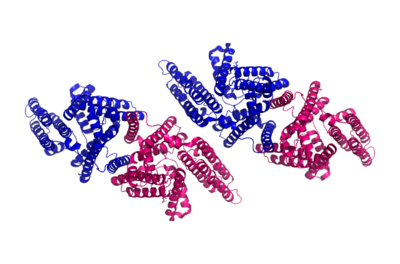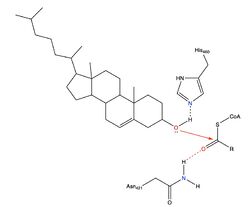User:Madison Unger/Sandbox 1
From Proteopedia
(Difference between revisions)
| Line 27: | Line 27: | ||
== Medical Relevance == | == Medical Relevance == | ||
| - | The mechanism of ACAT is essential for cholesterol storage and cholesterol transfer through the plasma because cholesteryl ester is the primary form of cholesterol used for these events. Additionally, ACAT can use a variety of different sterol molecules besides cholesterol as substrates and activators. Because of its biological importance, ACAT has been linked to [http://en.wikipedia.org/wiki/Atherosclerosis atherosclerosis], [http://en.wikipedia.org/wiki/Alzheimer%27s_disease Alzheimer’s disease], and cancer as a potential drug target for treatment of these diseases. Various studies have looked into ACAT inhibition and how that inhibition treats or prevents certain diseases, such as reducing the size and metastasis of certain tumors and reducing the formation of plaques in atherosclerosis. ACAT is an important target for these diseases due to its functional relevance in cholesterol metabolism. | + | The mechanism of ACAT is essential for cholesterol storage and cholesterol transfer through the plasma because cholesteryl ester is the primary form of cholesterol used for these events. Additionally, ACAT can use a variety of different sterol molecules besides cholesterol as substrates and activators. Because of its biological importance, ACAT has been linked to [http://en.wikipedia.org/wiki/Atherosclerosis atherosclerosis], [http://en.wikipedia.org/wiki/Alzheimer%27s_disease Alzheimer’s disease], and cancer as a potential drug target for treatment of these diseases<ref>PMID:17986151</ref>. Various studies have looked into ACAT inhibition and how that inhibition treats or prevents certain diseases, such as reducing the size and metastasis of certain tumors<ref>PMID:27132508</ref> and reducing the formation of plaques in atherosclerosis<ref>PMID:11100106</ref>. ACAT is an important target for these diseases due to its functional relevance in cholesterol metabolism. |
Revision as of 18:52, 12 April 2021
Human Acyl-CoenzymeA
| |||||||||||
References
- ↑ Qian H, Zhao X, Yan R, Yao X, Gao S, Sun X, Du X, Yang H, Wong CCL, Yan N. Structural basis for catalysis and substrate specificity of human ACAT1. Nature. 2020 May;581(7808):333-338. doi: 10.1038/s41586-020-2290-0. Epub 2020 May, 13. PMID:32433614 doi:http://dx.doi.org/10.1038/s41586-020-2290-0
- ↑ Cases S, Novak S, Zheng YW, Myers HM, Lear SR, Sande E, Welch CB, Lusis AJ, Spencer TA, Krause BR, Erickson SK, Farese RV Jr. ACAT-2, a second mammalian acyl-CoA:cholesterol acyltransferase. Its cloning, expression, and characterization. J Biol Chem. 1998 Oct 9;273(41):26755-64. doi: 10.1074/jbc.273.41.26755. PMID:9756919 doi:http://dx.doi.org/10.1074/jbc.273.41.26755
- ↑ Guan C, Niu Y, Chen SC, Kang Y, Wu JX, Nishi K, Chang CCY, Chang TY, Luo T, Chen L. Structural insights into the inhibition mechanism of human sterol O-acyltransferase 1 by a competitive inhibitor. Nat Commun. 2020 May 18;11(1):2478. doi: 10.1038/s41467-020-16288-4. PMID:32424158 doi:http://dx.doi.org/10.1038/s41467-020-16288-4
- ↑ Qian H, Zhao X, Yan R, Yao X, Gao S, Sun X, Du X, Yang H, Wong CCL, Yan N. Structural basis for catalysis and substrate specificity of human ACAT1. Nature. 2020 May;581(7808):333-338. doi: 10.1038/s41586-020-2290-0. Epub 2020 May, 13. PMID:32433614 doi:http://dx.doi.org/10.1038/s41586-020-2290-0
- ↑ Rogers MA, Liu J, Song BL, Li BL, Chang CC, Chang TY. Acyl-CoA:cholesterol acyltransferases (ACATs/SOATs): Enzymes with multiple sterols as substrates and as activators. J Steroid Biochem Mol Biol. 2015 Jul;151:102-7. doi: 10.1016/j.jsbmb.2014.09.008., Epub 2014 Sep 12. PMID:25218443 doi:http://dx.doi.org/10.1016/j.jsbmb.2014.09.008
- ↑ Hartmann T, Kuchenbecker J, Grimm MO. Alzheimer's disease: the lipid connection. J Neurochem. 2007 Nov;103 Suppl 1:159-70. doi: 10.1111/j.1471-4159.2007.04715.x. PMID:17986151 doi:http://dx.doi.org/10.1111/j.1471-4159.2007.04715.x
- ↑ Li J, Gu D, Lee SS, Song B, Bandyopadhyay S, Chen S, Konieczny SF, Ratliff TL, Liu X, Xie J, Cheng JX. Abrogating cholesterol esterification suppresses growth and metastasis of pancreatic cancer. Oncogene. 2016 Dec 15;35(50):6378-6388. doi: 10.1038/onc.2016.168. Epub 2016 May , 2. PMID:27132508 doi:http://dx.doi.org/10.1038/onc.2016.168
- ↑ Rudel LL, Shelness GS. Cholesterol esters and atherosclerosis-a game of ACAT and mouse. Nat Med. 2000 Dec;6(12):1313-4. doi: 10.1038/82110. PMID:11100106 doi:http://dx.doi.org/10.1038/82110
Student Contributors
- Leah Goehring
- Gabby Smith
- Anna Campbell



